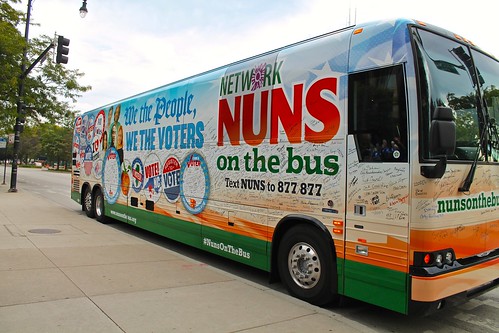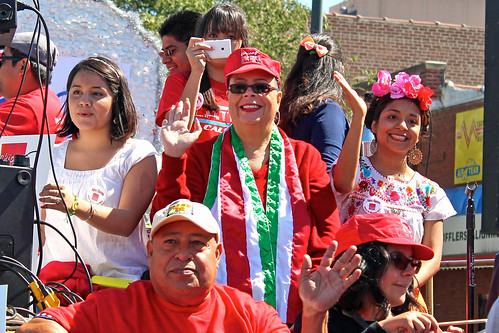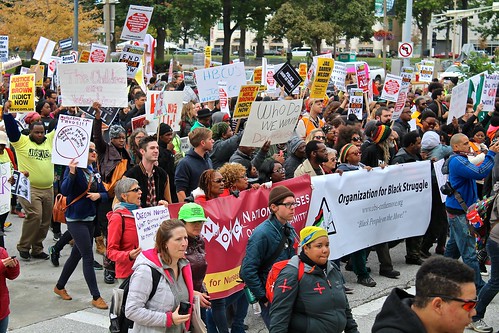The Chicago election: the electoral revolution that didn’t happen
It was one helluva an election season on the shores of Lake Michigan. Last summer I was brimming with optimism. The Chicago Teachers Union(CTU) had people out canvassing the neighborhoods. CTU President Karen Lewis was polling well in a possible mayoral bid and it looked like Mayor Rahm Emanuel was on the run.
I foresaw an electoral revolution in the works. As a veteran of the Harold Washington days, I imagined the charismatic Karen Lewis recruiting a working class army of supporters, including the the working poor and the unemployed. Energetic reform candidates for City Council would emerge. Many of the largely Black and Brown non-voters would finally have something worth voting for—for a change.
A multi-racial rainbow coalition would sweep into power on election day and the day after election day, face the combined wrath of the LaSalle Street bankers and hedge fund bunco artists. But we would not only have people in office, we’d have a powerful movement for social and economic justice to back them up.
It didn’t happen. Karen announced that she was seriously ill with a brain tumor and could not run. She is now undergoing treatment. (BTW Chicagoans love to call their politicians by their first names).
Filed under: Race and gender, Society and Economy, Unions, US politics
Tags:
Hair? Who cares? Apparently a lot of people.
Chicago Tribune columnist Heidi Stevens gets a lot of hate mail. Not about the words she dutifully turns out, but about her hair. Yes, her hair.
“How could anyone take seriously anything written by an author whose accompanying picture makes her look like a tramp, with greasy, matted, uncombed hair?” said David.
Really David?
“My neighbors and I give you permission to shoot your hairdresser, ” from Karen.
Uh, Karen, shooting hairdressers is illegal. I hope you know that.
For some very unsettling reasons, people, mostly women according to the author, are offended by her hair. To the point of actually writing to her. She prefers to ignore her hair and focus on other things. I know that hair (or the lack of it) is less of a social issue for men. We do live in a deeply sexist society after all.
Personally I just tuck what’s left of mine under a baseball cap and ignore it. Problem solved. But thanks to our repressive cultural norms, not everyone can adopt such simple solutions as hers or mine without a paying a price.
Paying a price? Yep, sometimes a very steep one, like the charge at the salon or the loss of a job. Really America…haven’t you something better to do than hating somebody’s hair?
Read the her article entire article: “Hate mail lesson: Uncombed hair threatens the natural order”
Filed under: Race and gender, Society and Economy
Tags:
Marching on Chicago’s far West Side for $15 an hour and a union
Yesterday March 22, several hundred people shut down a McDonalds at Laramie and North Ave on Chicago’s Far West Side and then marched on and through a Food 4 Less store located further east. It was a major Fight for $15 action. Fight for $15 is the national movement of low wage workers whom are working for a minimum wage of $15 an hour and union recognition. Chicago’s far West Side is a predominantly African American and Latino working class area and the numerous horn honks demonstrated the popularity of the action as far as local residents were concerned.
Filed under: Uncategorized
Tags:
Fight for $15 joins striking BP oil workers on the picketline
(Note: As of this writing there are reports that Shell, the industry leader, has reached a settlement with the United Steel Workers union which is on strike. Picketlines at BP are still up as of Friday afternoon March 13).
“It appeared as if the whole world was one elaborate system, opposed to justice and kindness, and set to making cruelty and pain.” ― Upton Sinclair from his novel OIL!
When 20th century writer Upton Sinclair’s novel Oil!, (about the birth of the petroleum industry) was turned into a film, it was titled “There Will Be Blood”. The film makers weren’t kidding. Humans go to war for oil. Workers die drilling and refining it. People die from pollution when oil is processed or burned. Oil may eventually contribute to the extinction of humanity though runaway climate change.
The small city of Whiting, Indiana is the site of the largest oil refinery in the Midwest. Workers at this sprawling BP facility have been on strike since February 8, 2015, part of a nation-wide strike by the United Steel Workers (USW).
The strike issues revolve mostly around health and safety; not only for the workers inside the plant, but for the Whiting residents whose modest homes extend nearly to the plant gates. Residents are concerned about toxic substances released into the air and water as well as the possibility of catastrophic explosions.
Last week, members of the Workers Organizing Committee of Chicago (WOCC), rented a bus and rode down to Whiting and joined the striking oil workers picketline for a few hours. WOCC is best known for its Fight for $15 campaign to organize fast food workers for $15 an hour and a union.
WOCC member Teresa Cervantes explained why in this translation from her native Spanish,” I am here to support my fellow workers from Fight for $15 and the BP workers who are on strike today fighting for justice and fair wages.”
Her solidarity sentiments were echoed by her friend Rufina Aranda, a McDonalds worker in Cicero IL and a Fight for $15 veteran.

Filed under: Society and Economy, Unions
Tags:
Chicago: It’s about more than just an election
For the past 6 months I worked on the electoral campaign of Zerlina Smith, a progressive candidate for Chicago City Council. She was part of a city-wide electoral revolt against austerity politics led by reform Democrats and political independents. She did not win outright or make the run-off, but some of the candidates did, including Chuy Garcia who is challenging Mayor Rahm Emanuel in the runoff election. I’ve had a little time to think about what I experienced.
I left a socialist meeting last night where we spent a couple of hours talking about the recent Chicago election. I think the word “money” came up more than the word “votes”.It was an acknowledgment that in our so-called democracy, “Money doesn’t talk, it swears.”
It reminded me of the training session I attended for candidates and election volunteers sponsored by a progressive political alliance. We were told in complete seriousness that one of the the most important jobs of the candidate was to get on the phone and call everyone that he or she knew—-and ask them for money.
And it was the campaign manager’s job to make sure that the candidate put in their required number of hours on the phone—whether they liked it or not.

Filed under: Society and Economy, US politics
Tags:
How long….how long?

The recent police murders remind me of the most terrifying days of the civil rights movement, when people were being killed with impunity and if the perpetrators were apprehended, were then set free by Jim Crow juries. Or during the days of the Black Panther Party when political assassinations were carried out across the country and in plain sight. Read more
Filed under: Race and gender, Society and Economy
Tags:
Ferguson means fight back: Thousands march in St. Louis against police violence
When Mike Brown was shot to death in Ferguson MO last summer, his hands up in surrender, he didn’t know when he awoke that morning that he would die that day as yet another victim of American racism. Neither did Oscar Grant, Trayvon Martin, Rekia Boyd or countless others, going back to when the first Black slave was killed for resisting their involuntary servitude.
That we are forced to carry signs that read “Black Lives Matter” in 2014 is a measure of how far the USA may have advanced in years but not in wisdom.
So we gathered once again in mourning and in anger. This time it was in downtown St Louis on October 11, part of a month-long series of events called Ferguson October. I boarded a bus at 4:30 am from South Side Chicago sponsored by the Chicago Teachers Union (CTU) and Action Now (a local community organizing group).
By around noon we were on Market Street in St Louis, marching past gray fortress-like court and government buildings that promise to guard justice and democracy, but too often fail to protect either.
Filed under: Race and gender, Society and Economy, US politics
Tags:
When the Nuns on the Bus rolled into Chicago
“We are working on voter registration which is an action people can take easily. It’s so important because there is so much big money in our country trying to steer legislation away from the common good.”– Dr. Patricia M. Fishman, Sisters of Mercy Associate
Nuns on the Bus? It sounds like a joke. But while the Catholic sisters of Nuns on the Bus do joke and laugh often, their mission is a serious one of social justice and compassion for the oppressed.
It was no joke to Sister Marie McKenna who is a social activist in Chicago:
“I work with a lot of people who can’t afford to pay their rent. They’re working full time but there is no living wage for them. Lots of folks are pulled into part-time employment situations with no benefits. If there is an illness or anything that disrupts even a short period of time, people are going under.”
Started in 2012 as a reaction to the Paul Ryan budget which punished people simply for the “sin” of being poor, Nuns on the Bus is a traveling group of nuns who ride across the country to promote their social justice agenda. In 2013, the theme of Nuns of the Bus was immigration. In 2014 it was voter registration.
Chicago was one of the bus stops for a day of action last week on Thursday September 25, 2014.

Working with Arise Chicago, a local workers center, there were plans for a morning of voter registration among students at the University of Illinois at Chicago (UIC), a meeting with Governor Pat Quinn where 3 low wage workers could tell their stories and a picnic in Union Park followed by a press conference and rally. Read more
Filed under: Society and Economy, Unions, US politics
Tags:
Run, Karen Run….with Chicago’s working class

Chicago Teachers Union President Karen Lewis
at the 2014 Mexican Independence Day parade in Chicago
When the Chicago Teachers Union (CTU) denounced Chicago’s traditional racism and segregation as “education apartheid” and linked school closings to corporate privatization of schools and real estate speculation, it helped provide a clear narrative that I heard over and over again from Chicagoans at rallies, hearings and meetings all over the city.
Apartheid is a harsh word, but it was accurate and on point.
So when CTU President Karen Lewis came out in support of Fight for $15 and expressed strong opposition to cuts in vital city services that hit hardest at Chicago’s poorest neighborhoods, she helped cement her reputation as a leader of the working class against racism and class exploitation.
Clarity on race and class is essential for her to win a mayoral election in Chicago. Because what is good for the working class is good for the city as a whole. Read more
Filed under: Uncategorized
Tags:
The USA’s toxic culture of white wealth
“Despite all evidence to the contrary, blaming black culture for racial inequality remains politically dominant. And not only on the Right.”—–Jonah Birch & Paul Heideman
This morning I read the latest attempt to chip away at the “culture of poverty” mythology that has survived all previous attempts to debunk it. Published in the always interesting Jacobin Magazine, the article “The Poverty of Culture” by Jonah Birch & Paul Heideman got me rethinking my own ideas on the subject.
So here goes a BobboSphere reaction to the Jacobin article:
If you believe the dominant narrative in today’s mass media and political culture, racial inequality and its accompanying economic inequality is the fault of African Americans because of their supposed “culture of poverty”. This monstrous canard has been disproved in countless studies, but somehow its proponents never get voted off the island.
What the corporate owned media does not dwell upon is the toxic “culture of wealth” that exists within the white corporate elite (yes, it is still white dominated). They prefer to overlook the white corporate elite’s propensity toward coldblooded mass violence in the form of the wars they help start, of their criminality as evidenced by their massive financial and environmental crimes, or their contempt for work as shown by the habit of driving down wages, and assigning jobs based on race and gender while treating employees with inhumane disrespect. Read more
Filed under: Race and gender, Society and Economy, US politics
Tags:





